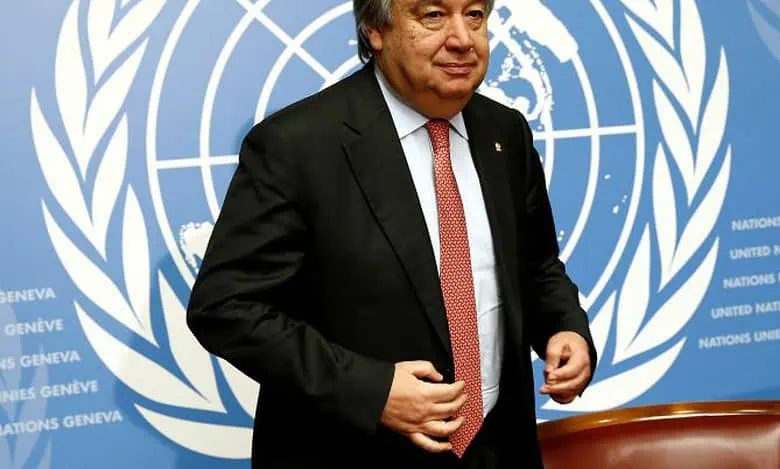
Israel Bans UN Chief Entry
Israel Blocks UN Secretary-General Antonio Guterres
In a bold move, Israel has banned the entry of United Nations Secretary-General Antonio Guterres into the country, following his response to a massive missile attack launched by Iran and its allied militant groups. The decision came on October 2, shortly after Guterres issued a statement regarding the attack without specifically naming Iran as the aggressor. The Israel bans UN Secretary-General news has sparked significant global attention and diplomatic discourse.

Iran Launches 180 Ballistic Missiles on Israel
The tensions between Israel and its regional adversaries escalated further when Iran, alongside militant groups like Hezbollah and the Houthis, launched a 180-ballistic missile attack on Israel on the night of October 1. This large-scale strike, carried out by the Iranian Revolutionary Guard Corps (IRGC), came as retaliation for Israel’s targeted killings of key militant leaders, including Hezbollah chief Hassan Nasrallah and Hamas chief Ismail Haniyeh.
According to reports, the missile barrage targeted multiple areas across Israel, placing millions of civilians in immediate danger. The attack significantly heightened tensions in the region, drawing sharp reactions from both sides. In this context, Guterres’ public statement, which failed to single out Iran as the responsible party, triggered strong discontent within Israel’s government.
Israel’s Reaction to Guterres’ Statement
Israel’s response to Guterres’ remarks was swift and decisive. Eli Cohen, Israel’s Foreign Minister, took to the X platform (formerly known as Twitter) to announce the ban. In his post, Cohen said, “Today, I have banned UN Secretary-General @antonioguterres from entering Israel. Anyone who cannot unequivocally condemn Iran’s heinous attack on Israel does not deserve to step foot on Israeli soil.”
The Israel bans UN Secretary-General decision was clearly motivated by frustration over what Israeli officials saw as an inadequate response from the UN chief. In particular, they were dismayed by Guterres’ failure to hold Iran accountable for the attack, which involved the firing of 180 ballistic missiles into Israeli territory. The missiles, aimed at populated areas, represented a serious escalation in the ongoing conflict.
UN Secretary-General’s Position
Guterres, who has consistently advocated for diplomacy and peaceful resolution of conflicts in the Middle East, issued a general condemnation of the “latest attack in the Middle East” but avoided directly attributing the attack to Iran. His statement came after Israel had openly accused the Iranian Revolutionary Guard Corps of orchestrating the assault in conjunction with Hezbollah and the Houthis.
For Israeli officials, Guterres’ lack of specificity in condemning Iran was seen as a critical failure. The Israel bans UN Secretary-General move reflects deep dissatisfaction with what they perceive as the UN’s tendency to remain neutral or ambiguous in situations where clear condemnation is needed.
Israel Condemns Guterres on Social Media
Israel’s frustration with Guterres was not only expressed through official channels but also on social media. Following the UN chief’s statement, Israel’s official X account sharply criticized Guterres’ inability to directly call out Iran for the missile attack. In a direct reply to his post, the State of Israel’s account said, “We condemn your inability to string together a tweet which holds Iran responsible for firing 181 ballistic missiles at 10 million Israeli civilians.”
This public condemnation reflects the Israeli government’s growing impatience with international actors who, in their view, fail to take a firm stance against state-sponsored terrorism and aggression. For Israel, the missile attack, which endangered millions of lives, was a stark reminder of the threats posed by Iran and its allies, and the failure to condemn such actions only emboldens their adversaries.
The Aftermath and Diplomatic Implications
The Israel bans UN Secretary-General decision is expected to have significant diplomatic implications, not only for relations between Israel and the UN but also for broader international efforts to mediate peace in the Middle East. Israel’s decision to block Guterres could complicate future negotiations and diminish the UN’s role as a neutral party in the Israeli-Iranian conflict.
While Guterres has not yet responded directly to the ban, it remains to be seen how this move will impact his ability to engage with both Israel and its neighbors in future peace efforts. The international community, meanwhile, has expressed concern about the increasing tensions in the region and the potential for further escalation.
Conclusion: Rising Tensions Amid Diplomatic Fallout
Israel’s decision to ban the entry of UN Secretary-General Antonio Guterres marks a significant escalation in its dissatisfaction with the international community’s handling of Middle Eastern conflicts. The Israel bans UN Secretary-General move came in direct response to Guterres’ failure to unequivocally condemn Iran’s missile attack on Israel, which has intensified an already volatile situation in the region. With both Israel and its adversaries poised for further conflict, the role of international diplomacy may face new challenges in the days ahead.
Disclaimer: The content provided in this article is based on publicly available reports and statements. It is intended for informational purposes only and does not constitute official diplomatic or political advice.


